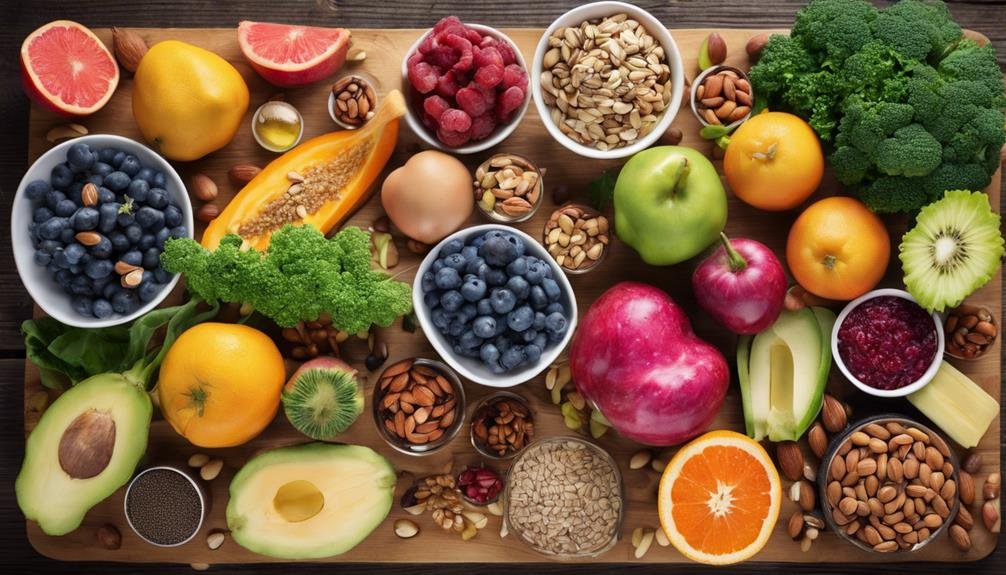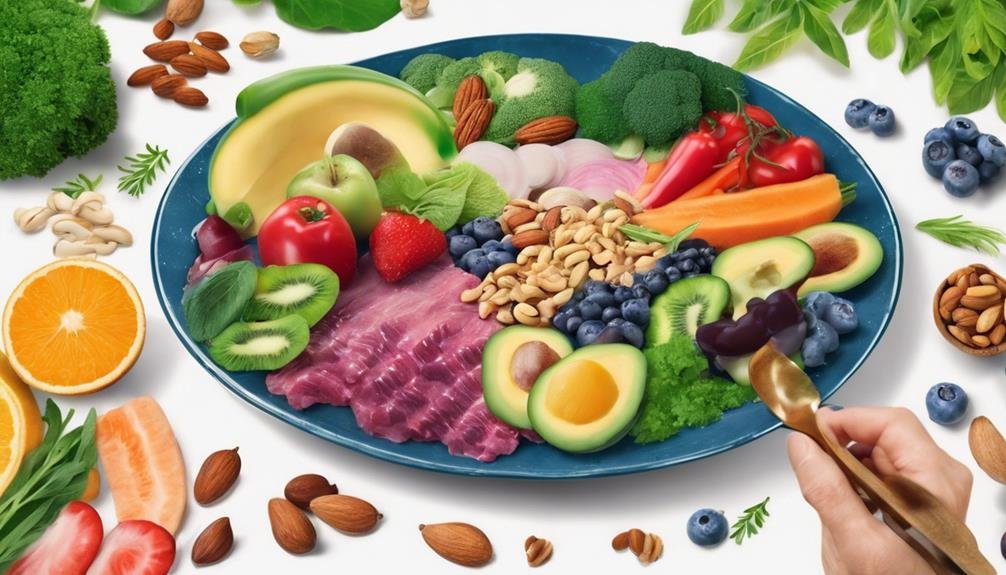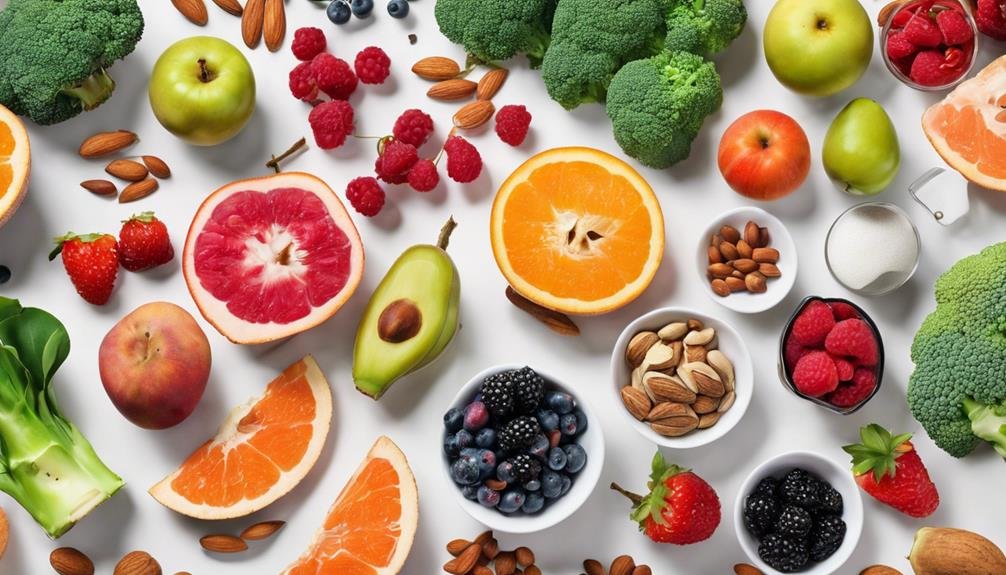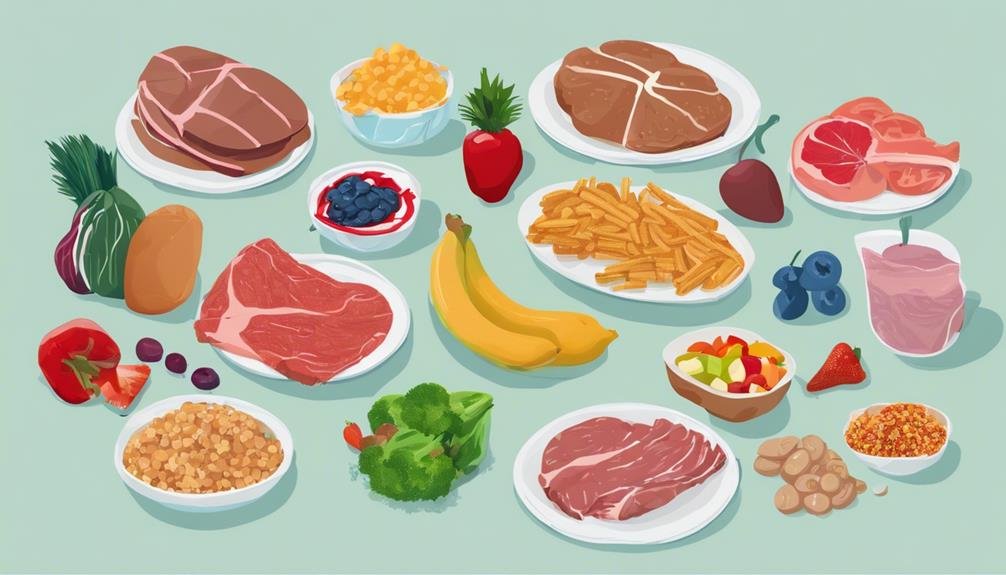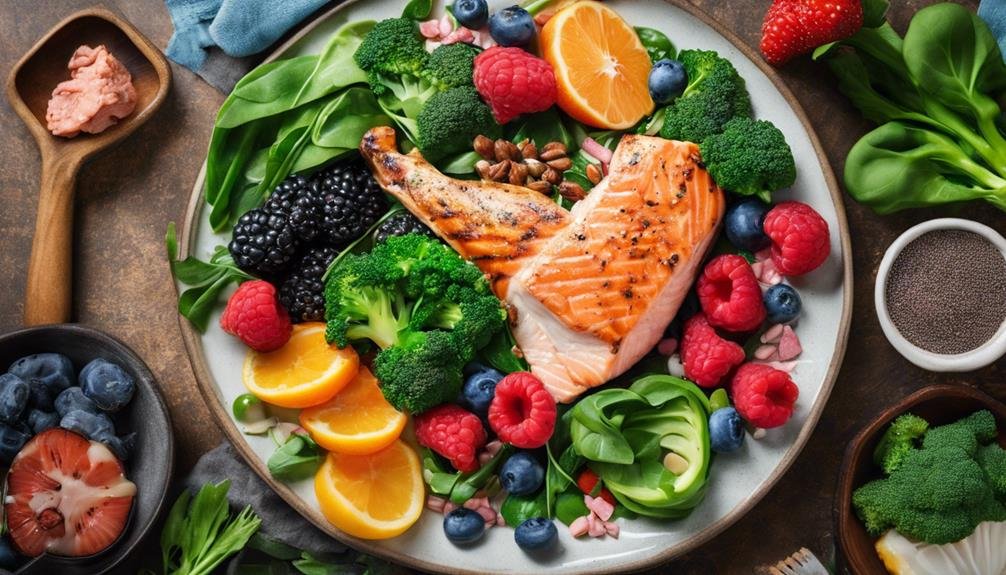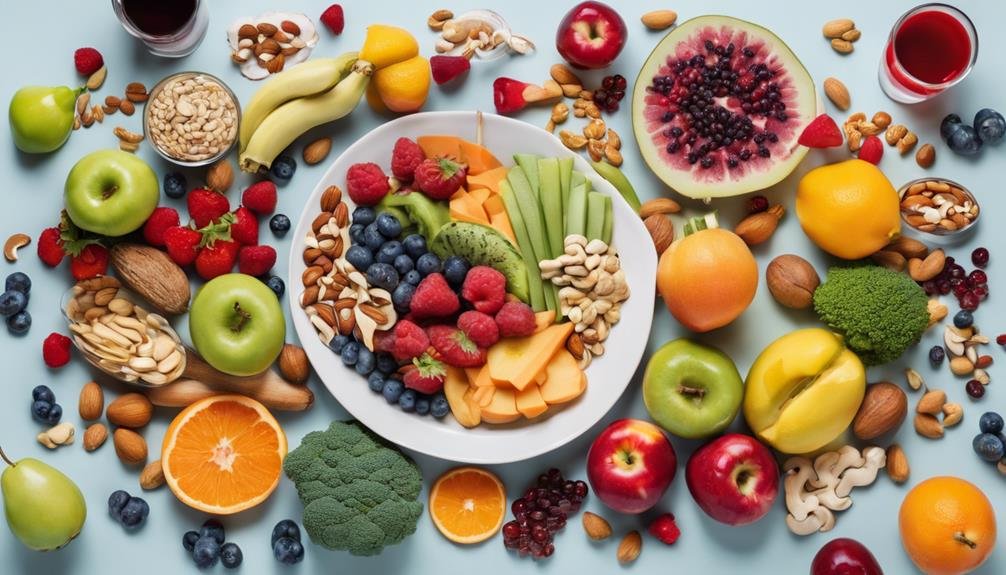As you ponder the role of diet in cancer prevention, the Paleo diet emerges as a compelling candidate. Its emphasis on whole, unprocessed foods and the avoidance of inflammatory agents make it a subject of interest in the realm of oncology. The potential mechanisms through which the Paleo diet may influence cancer risk are both intriguing and complex. Could this dietary approach offer a promising avenue for those seeking to proactively manage their health?
Evolution of the Paleo Diet
The evolution of the Paleo Diet can be traced back to our ancestors from the Paleolithic era, around 2.5 million to 10,000 years ago. During this time, humans were hunters and gatherers, relying on foods like lean meats, fish, fruits, vegetables, nuts, and seeds. This diet was dictated by what was naturally available in the environment, devoid of processed foods, grains, or dairy products.
The concept behind the Paleo Diet stems from the idea that our bodies are best adapted to the diet of our ancestors, as our genetics have changed little since then. By consuming foods that our bodies are evolutionarily designed to process efficiently, the Paleo Diet aims to optimize health and well-being.
This dietary approach emphasizes whole, nutrient-dense foods, mirroring the diet of early humans. Researchers suggest that embracing this ancient way of eating may offer numerous health benefits, potentially reducing the risk of chronic diseases and promoting overall wellness.
What Is the Paleo Diet?
Tracing back to our ancestors during the Paleolithic era, the Paleo Diet reflects the dietary habits of early humans, focusing on whole, unprocessed foods that were naturally available. This diet emphasizes foods that our ancestors could hunt, gather, or find growing naturally.
Here are three key principles of the Paleo Diet:
- Whole Foods: The foundation of the Paleo Diet is built on consuming whole, unprocessed foods such as lean meats, fish, fruits, vegetables, nuts, and seeds.
- Elimination of Processed Foods: Processed foods, grains, dairy, and sugars are typically avoided in the Paleo Diet due to their absence in the diet of early humans.
- Focus on Healthy Fats and Proteins: The diet encourages the consumption of healthy fats like avocados, olive oil, and nuts, as well as protein sources like grass-fed meat and wild-caught fish.
Nutrient-Dense Foods in Paleo
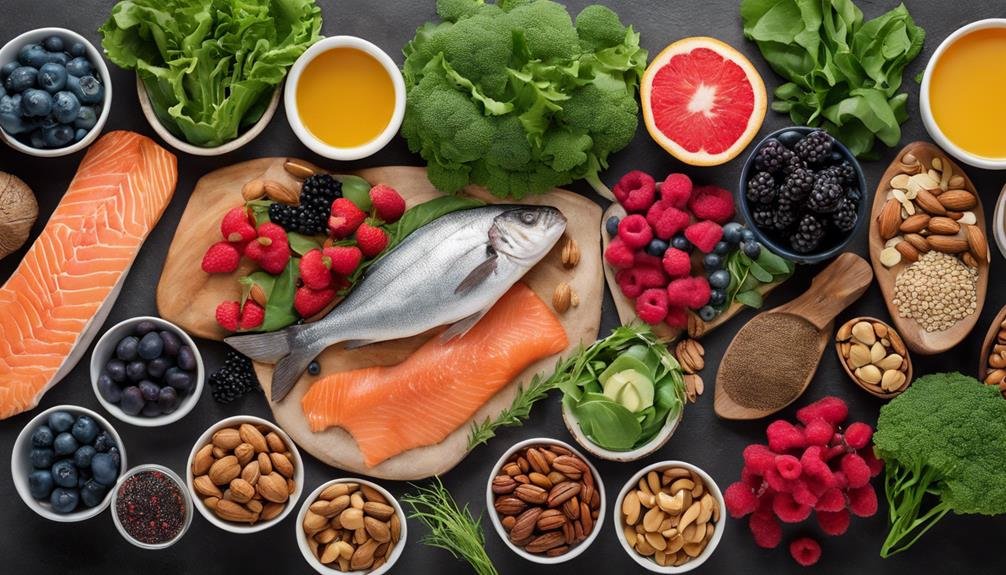
Adopting a Paleo Diet rich in nutrient-dense foods offers a strategic approach to fueling your body with essential vitamins, minerals, and antioxidants. Nutrient-dense foods commonly found in the Paleo Diet include lean proteins like grass-fed meats, seafood, eggs, and plant-based sources such as nuts, seeds, fruits, and vegetables. These foods are packed with nutrients vital for maintaining optimal health and supporting your body's defense mechanisms against diseases like cancer.
For instance, colorful fruits and vegetables provide a wide array of antioxidants like vitamin C, beta-carotene, and polyphenols, which help combat oxidative stress and inflammation linked to cancer development.
Additionally, including sources of healthy fats such as avocados, olive oil, and fatty fish in your diet supports overall well-being and aids in reducing inflammation, a key factor in cancer risk.
Inflammation and Cancer Risk
To understand the relationship between inflammation and cancer risk, it's crucial to delve into the intricate mechanisms by which chronic inflammation can contribute to the development and progression of cancer. Chronic inflammation creates an environment in the body that promotes the growth and spread of cancer cells.
Here are three key points to consider:
- Inflammatory Cytokines: Chronic inflammation leads to the release of inflammatory cytokines, signaling molecules that can stimulate the growth of cancer cells and promote tumor formation.
- DNA Damage: Inflammation can cause DNA damage in cells, increasing the likelihood of mutations that can lead to cancer development.
- Immune System Suppression: Prolonged inflammation can weaken the immune system, compromising its ability to identify and eliminate cancerous cells effectively.
Impact on Insulin Sensitivity
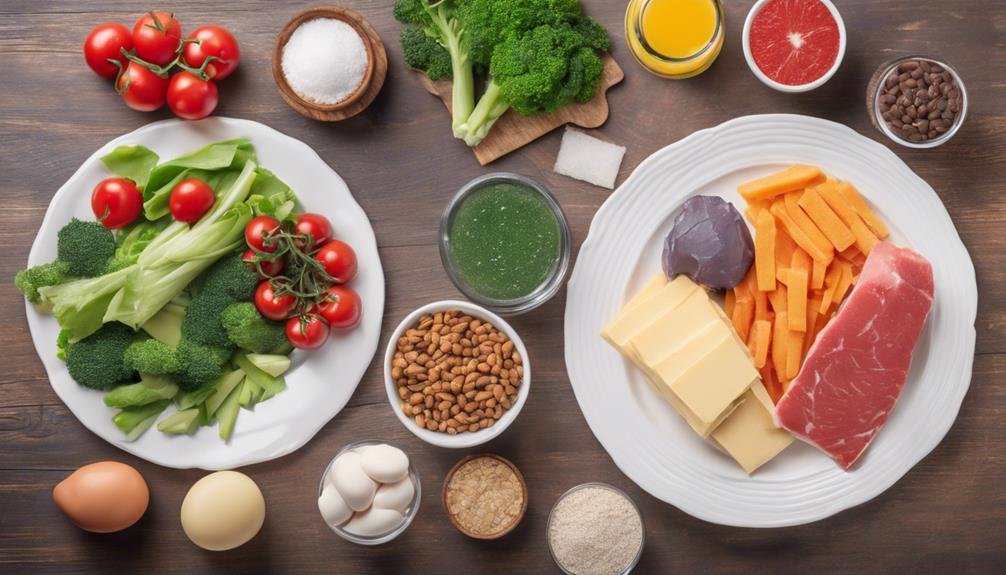
Understanding the impact of the Paleo diet on insulin sensitivity is essential for comprehending its potential role in cancer prevention. The Paleo diet, rich in whole foods like lean proteins, fruits, vegetables, nuts, and seeds, has shown promising effects on insulin sensitivity. By eliminating processed sugars and refined carbohydrates, the diet helps stabilize blood sugar levels, reducing the risk of insulin resistance.
Insulin resistance is a condition where cells fail to respond to insulin properly, leading to elevated blood sugar levels, which can promote cancer development. Studies suggest that a diet low in processed sugars and high in fiber, like the Paleo diet, may improve insulin sensitivity and lower insulin levels, potentially reducing cancer risk.
Additionally, incorporating healthy fats like those found in avocados and olive oil can further enhance insulin sensitivity. By following a Paleo diet focused on whole, nutrient-dense foods, you can positively impact your insulin sensitivity and potentially lower your risk of cancer.
Role of Red Meat
In considering the Paleo diet's impact on cancer prevention, it's crucial to examine the role of red meat consumption. Red meat has been a topic of debate regarding its association with cancer risk. Here are three key points to help you understand its role:
- Protein Source: Red meat is a rich source of high-quality protein, essential for maintaining muscle mass and overall health. However, moderation is key as excessive consumption may have potential health risks.
- Heme Iron Content: Red meat contains heme iron, which is more readily absorbed by the body compared to non-heme iron found in plant-based foods. While iron is necessary for various bodily functions, high intake of heme iron has been linked to certain cancers.
- Preparation Methods: The way red meat is cooked can impact its carcinogenic potential. Avoiding high-temperature cooking methods like grilling or charring can help reduce the formation of harmful compounds.
Balancing the benefits of red meat with potential risks is essential in following a cancer-preventative Paleo diet.
Impact on Gut Health
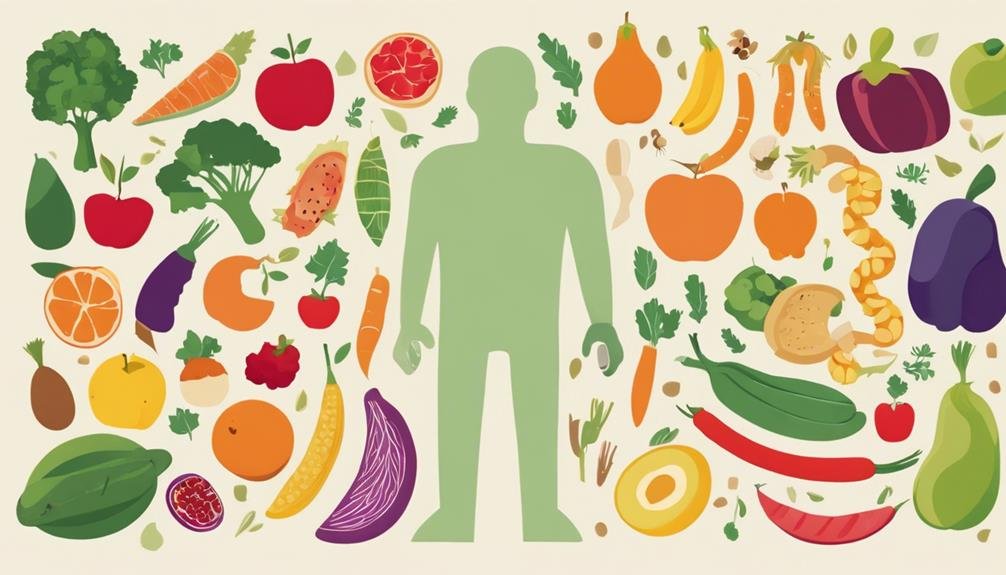
Examining the impact of the Paleo diet on gut health reveals a significant connection between dietary choices and the well-being of the digestive system. The Paleo diet, rich in fruits, vegetables, lean meats, nuts, and seeds, can positively influence gut health. This diet eliminates processed foods, refined sugars, and grains that can disrupt the balance of gut bacteria. By focusing on whole foods, the Paleo diet provides essential nutrients that support a healthy gut microbiome. Research suggests that a diverse and balanced microbiome is key to overall health and may help prevent various diseases, including cancer.
Moreover, the high fiber content in fruits and vegetables consumed on the Paleo diet promotes a healthy gut by supporting regular bowel movements and feeding beneficial gut bacteria. These foods also contain prebiotics that help nourish the gut microbiota, contributing to a robust immune system and reducing inflammation.
Antioxidants and Phytochemicals
With a focus on the Paleo diet's impact on preventing cancer, it's vital to explore the role of antioxidants and phytochemicals in this dietary approach. These compounds play a crucial role in promoting health and reducing the risk of cancer development. Here's why they're essential:
- Antioxidants: These powerful substances help protect your cells from damage caused by free radicals, which are unstable molecules that can harm cells and lead to cancer. By neutralizing these free radicals, antioxidants help reduce inflammation and support overall health.
- Phytochemicals: Found in plant-based foods, phytochemicals have been shown to have anti-cancer properties. They can help regulate cell growth, repair DNA damage, and even induce cancer cell death. Including a variety of colorful fruits and vegetables in your diet ensures you benefit from a wide range of phytochemicals.
- Anti-inflammatory Effects: Both antioxidants and phytochemicals in the Paleo diet have potent anti-inflammatory effects, which are crucial in reducing the risk of chronic inflammation that can contribute to cancer development. By incorporating these elements into your meals, you're supporting your body in fighting off potential cancer threats.
Potential Benefits of Fasting
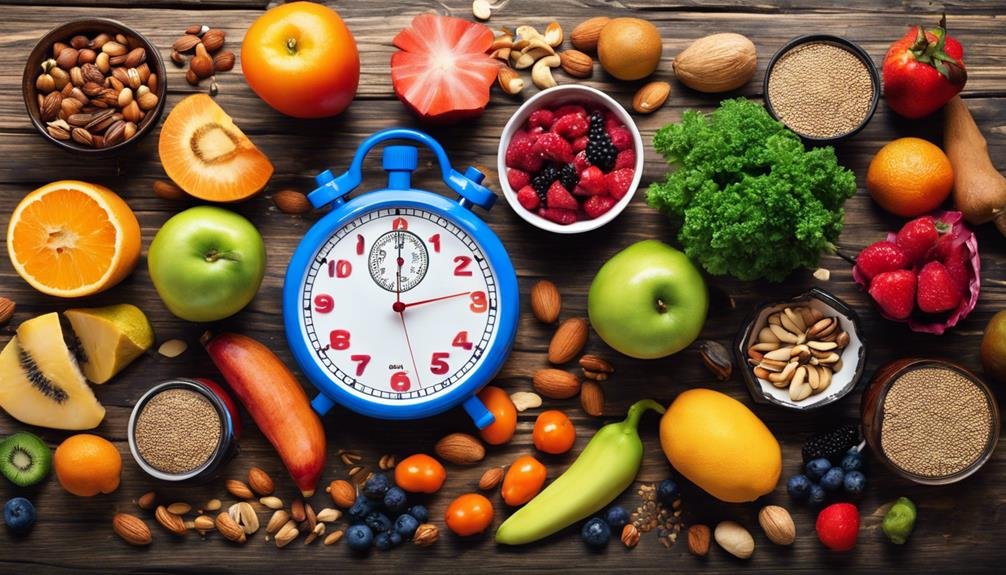
Exploring the potential benefits of fasting reveals intriguing insights into how this dietary practice can impact cancer prevention. Fasting has shown to enhance cellular health by triggering autophagy, a process where cells remove damaged components and recycle them for energy. This mechanism may help protect against cancer development by eliminating potentially harmful cells before they become cancerous.
Additionally, fasting has been associated with reduced inflammation levels in the body, which is a key factor in cancer progression. By lowering inflammation, fasting may create an environment less conducive to tumor growth.
Moreover, fasting can improve insulin sensitivity and regulate blood sugar levels, both of which are crucial in cancer prevention as cancer cells often thrive in high sugar environments. Incorporating intermittent fasting or time-restricted eating patterns into your dietary routine may offer potential benefits in reducing cancer risk, although more research is needed to fully understand the extent of fasting's impact on cancer prevention.
Research Studies on Paleo and Cancer
Shifting the focus from fasting to the impact of dietary patterns on cancer, research studies on the Paleo diet and its potential relationship to cancer prevention have garnered increasing attention. When delving into the realm of Paleo and cancer prevention, consider the following key findings:
- Reduced Inflammation: Studies suggest that the Paleo diet, rich in anti-inflammatory foods like fruits, vegetables, and healthy fats, may help lower chronic inflammation levels, which is linked to cancer development.
- Balanced Insulin Levels: By emphasizing whole foods and eliminating processed sugars and refined carbohydrates, the Paleo diet may support stable blood sugar levels. This balance could potentially reduce the risk of insulin resistance, a factor associated with certain cancers.
- Increased Nutrient Density: The emphasis on nutrient-dense foods in the Paleo diet may provide essential vitamins, minerals, and antioxidants that support overall health and potentially reduce the risk of cancer.
These research findings highlight the potential benefits of adopting a Paleo diet as a preventive measure against cancer, emphasizing the importance of dietary choices in promoting long-term well-being.
Practical Tips for Paleo Eating
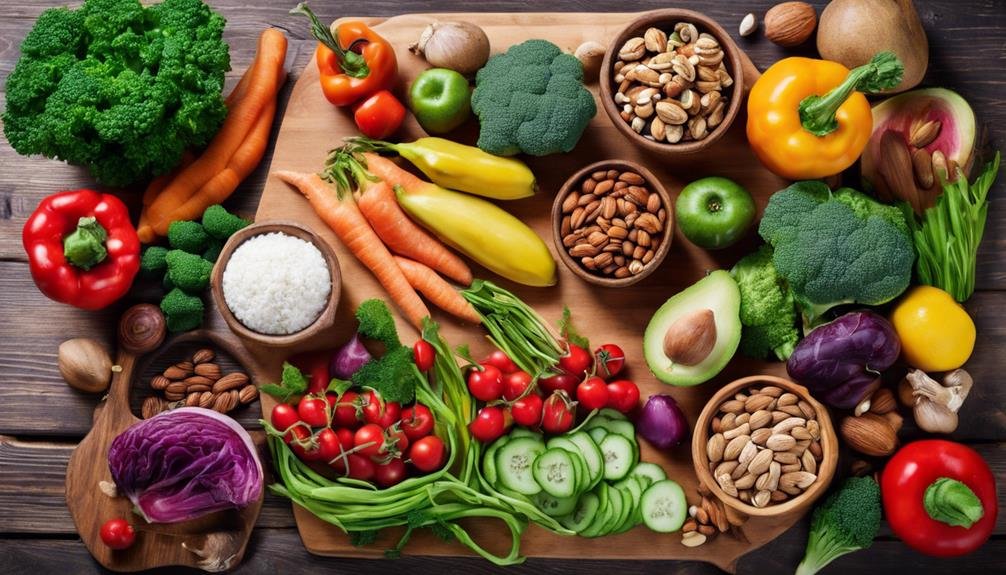
To effectively adhere to a Paleo diet for potential cancer prevention, incorporating practical tips for Paleo eating can significantly enhance your dietary habits. When following the Paleo diet, prioritize consuming lean proteins like grass-fed meat, poultry, fish, and eggs. Include a variety of colorful vegetables in your meals to ensure a rich intake of vitamins, minerals, and antioxidants that can potentially reduce cancer risk. Opt for healthy fats such as avocados, olive oil, and nuts, which provide essential nutrients and support overall well-being. Avoid processed foods, sugars, and grains, as these can contribute to inflammation and potentially increase cancer risk.
Meal planning is key to success on the Paleo diet. Prepare your meals in advance to avoid unhealthy temptations and ensure you have nutritious options readily available. Experiment with different herbs and spices to enhance the flavor of your dishes without relying on unhealthy additives.
Remember to stay hydrated by drinking plenty of water throughout the day to support digestion and overall health. By following these practical tips for Paleo eating, you can optimize your dietary choices and potentially reduce your risk of cancer.
Conclusion and Future Directions
In light of the practical tips shared for adhering to a Paleo diet aimed at potentially preventing cancer, it's crucial to consider the overall impact of dietary choices on health outcomes. Making informed decisions regarding your diet is key to promoting overall well-being and reducing the risk of cancer. Here's what you should keep in mind:
- Focus on Whole Foods: Emphasize consuming whole, unprocessed foods like fruits, vegetables, lean proteins, and healthy fats to maximize the nutritional benefits of the Paleo diet.
- Stay Hydrated: Adequate hydration is essential for overall health and plays a role in cancer prevention. Opt for water as your primary beverage choice.
- Regular Physical Activity: Complementing your dietary choices with regular exercise can further enhance the preventive benefits against cancer and promote overall health.
Frequently Asked Questions
Can the Paleo Diet Cure Cancer?
The idea that the Paleo diet can cure cancer isn't scientifically supported. While a healthy diet rich in whole foods, fruits, and vegetables can play a role in cancer prevention and overall well-being, it's important to seek evidence-based treatments for cancer under the guidance of medical professionals.
It's crucial to approach cancer treatment comprehensively, including medical interventions, lifestyle changes, and nutritional support for the best outcomes.
Are There Any Risks Associated With the Paleo Diet?
When considering the Paleo diet, it's crucial to be aware of potential risks.
Possible drawbacks include inadequate calcium and vitamin D intake due to limited dairy consumption.
Furthermore, the diet's emphasis on red meat could potentially increase saturated fat intake, impacting heart health.
To mitigate these risks, focus on a balanced approach that includes a variety of nutrient-dense foods.
Consulting with a healthcare provider or registered dietitian can provide personalized guidance for a safe and effective dietary plan.
Can Children Follow the Paleo Diet Safely?
Yes, children can safely follow the Paleo diet with proper planning. Encourage a variety of fruits, vegetables, lean proteins, and healthy fats. Ensure they get enough calcium and vitamin D from alternative sources. Monitor their growth and development closely, adjusting the diet as needed. Consult with a healthcare provider or dietitian to ensure all nutritional needs are met. Remember, moderation and balance are key for children following any specific diet plan.
Is It Expensive to Maintain a Paleo Diet?
Maintaining a paleo diet can be costly due to the emphasis on high-quality, organic foods. Fresh fruits, vegetables, and grass-fed meats can come with a higher price tag compared to processed alternatives. However, by planning meals, buying in bulk, and focusing on seasonal produce, you can manage costs effectively.
Prioritizing key nutrients and food quality is essential for the paleo diet's success, which may require investing more in your grocery budget.
Are There Any Specific Supplements Recommended on the Paleo Diet?
When following the Paleo diet, there are specific supplements that can complement your nutritional intake. Common recommendations include Vitamin D, Omega-3 fatty acids, and Magnesium.
Vitamin D is vital for bone health and immune function, while Omega-3s support heart health and brain function. Magnesium plays a role in muscle function and energy production.
Consulting with a healthcare provider can help tailor supplement choices to your individual needs on the Paleo diet.
Conclusion
In conclusion, embracing the Paleo diet as a preventive measure against cancer is akin to building a fortress of health with nutrient-dense foods as the bricks and antioxidants as the shield. By focusing on inflammation reduction, insulin sensitivity improvement, and intermittent fasting, you are reinforcing your body's defenses against potential cancer risks. Make informed dietary choices, prioritize whole foods, and take proactive steps towards a healthier future.
